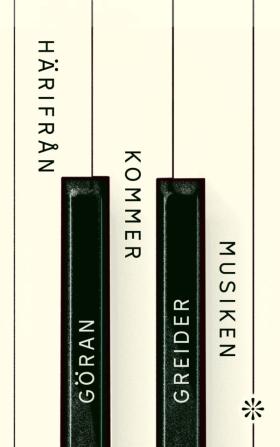
Härifrån kommer musiken
(Where Music Comes From)
by Göran Greider
reviewed by Margaret Dahlstrom
Göran Greider is a popular and award-winning Swedish writer, probably best known as a poet, but also a writer of prose, fiction, and opinion pieces. He has published more than 30 books, and is the chief editor of a regional newspaper. He has written on politics, history, and personal experiences. His literary awards include most recently ‘De Nios stora pris’ in 2024 for his body of work.
Härifrån kommer musiken (Where Music Comes From) is a collection of his essays and short pieces on music. In his introduction (‘Prelude’), he quotes a question attributed to Ingmar Bergman: ‘Where does music come from?’ This volume is his reply. He does not attempt to reach a definitive answer to Bergman’s question; rather, he explores his own personal responses and reactions to a variety of musical styles, genres, and composers. His taste ranges from long-established classics to recent pop music, and he considers the part played in society by music, in formal situations and everyday contexts. A major trope explored by Greider is the relationship between music and nature. He describes music which conveys the wind, a storm, a forest, and the music he seems to hear when in a forest or during a storm.
Greider stresses his layman status, acknowledging that he can’t read the scores of the works he loves. But he’s a very well-informed layman, knowledgeable about the works, composers, performances, and audience reactions. These essays were written at different times, and a number have been published previously. In this collection they are presented in numbered but unnamed sections, grouped according to themes. But of course there is overlap – a theme or characteristic described in one essay may also be pertinent to a work in a different section. This avoids any sort of fragmentation or compartmentalising – music is interrelated, music crosses borders and boundaries.
He believes that listening to music is always liberating, and yet music can be used to manipulate, stirring feelings of war, patriotism and spirituality. This is just one of several contradictions or paradoxes he notes in music. One particular challenge is responding to inspirational music by unlikeable composers, people whose views or behaviour make them personally unpalatable, even though they may have written very beautiful or extremely popular music. He cites Sibelius and Wagner, but does not suggest ‘cancelling’ them – rather, the music speaks for itself, in spite of its creators.
Because he identifies as a layman in the field, Greider is unconstrained by professional exclusiveness or any sense of a hierarchy of musical forms. He juxtaposes essays on established classics with pieces on pop music, and includes a section on the disappearance of whistling. People don’t whistle any more, he observes, and he links this to the loss of optimism about the world and the future. This in turn suggests a further question - where does music go? – but he does not examine that here.
The trope of pessimism about the state and future of the world recurs in a number of essays and across several of the genres he explores. He notes that Beethoven’s Eroica Symphony no longer engages him as much as it once did, because of the constant presence and awareness of war and threat in the contemporary world. He has considered using a bugle ceasefire signal as a ringtone, but has not done so for fear of triggering others or sending a false message.
Across the genres and composers, Greider draws links between historical events and the music of the times - eras of war producing warlike music in Beethoven’s work, or conversely, reacting and producing an escape, such as Bach’s spiritual music. In the case of popular music, too, he perceives the Zeitgeist, as in the works of Dylan, Cohen and Mitchell. Where selected composers of any style are highlighted the reader may think of an apparently overlooked example. But this is not intended as a comprehensive overview of music: these are Greider’s selections and his personal views.

Härifrån kommer musiken
Volante, Stockholm, 2025, 272 pages
Foreign rights: the publisher
Göran Greider is a popular and award-winning Swedish writer, poet and cultural commentator. He has published more than 30 books, and is the chief editor of a regional newspaper.
